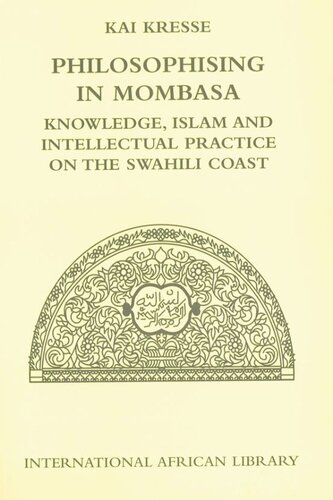

Most ebook files are in PDF format, so you can easily read them using various software such as Foxit Reader or directly on the Google Chrome browser.
Some ebook files are released by publishers in other formats such as .awz, .mobi, .epub, .fb2, etc. You may need to install specific software to read these formats on mobile/PC, such as Calibre.
Please read the tutorial at this link: https://ebookbell.com/faq
We offer FREE conversion to the popular formats you request; however, this may take some time. Therefore, right after payment, please email us, and we will try to provide the service as quickly as possible.
For some exceptional file formats or broken links (if any), please refrain from opening any disputes. Instead, email us first, and we will try to assist within a maximum of 6 hours.
EbookBell Team

4.4
12 reviewsPhilosophising in Mombasa provides an approach to the anthropological study of philosophical discourses in the Swahili context of Mombasa, Kenya. In this historically established Muslim environment, at the dawn of the twenty-first century, philosophy is investigated as social discourse and intellectual practice, situated in everyday life. This is done from the perspective of an 'anthropology of philosophy', a project which is spelled out in the opening chapter.
Entry-points and guidelines for the ethnography are provided by discussions of Swahili literary genres, life histories, and social debates. From here, local discourses of knowledge are described and analysed. The social environment and discursive dynamics of the Old Town are portrayed, firstly, by means of following and contextualising informal discussions among neighbours and friends at daily meeting points in the streets; and secondly, by presenting and discussing in-depth case studies of local intellectuals and their contributions to moral and intellectual debates within the community. Taking recurrent internal discussions on social affairs, politics, and appropriate Islamic conduct as a focus, this study sheds light on local practices of critique and reflection.
In particular, three local intellectuals (two poets, one Islamic scholar) are portrayed against the background of regional intellectual history, Islamic scholarship, as well as common public debates and private discussions. The three contextual portrayals discuss exemplary issues for the wider field of research on philosophical discourse in Mombasa and the Swahili context on the whole, with reference to the lives and projects of distinct individual thinkers. Ultimately, the study directs attention beyond the regional and the African contexts, towards the anthropological study of knowledge and intellectual practice around the world.